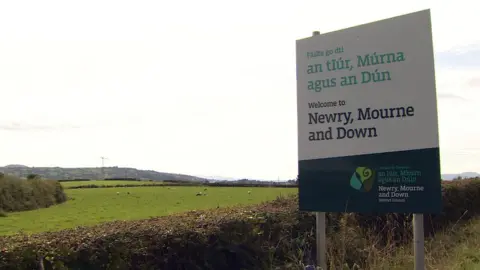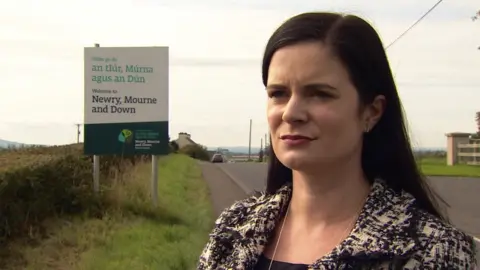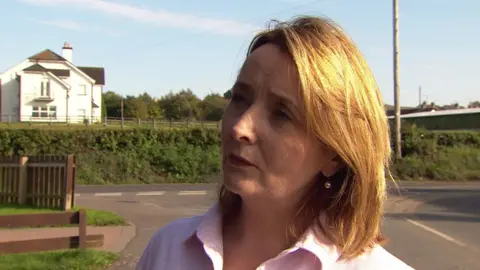The View: Political tug of war over Irish language Act
 BBC
BBCTake a drive around the outskirts of the pretty hilltop town of Rathfriland and you will come across a couple of signs welcoming you to the Newry, Mourne and Down District Council.
The signs are in Irish and English and part of the council's policy of promoting the Irish language.
They are placed on the road to Newry and on the way to Castlewellan.
Most motorists probably pay little attention to them, but the bilingual signs have become a regular target for vandals.
In the centre of Rathfriland you will find the offices of the County Down Outlook newspaper edited by Joanne Ross.
Her paper has covered the attacks on the signs.
"The sign on the Newry road out of Rathfriland and the Castlewellan road were daubed with paint on at least three occasions," she said.
"The most recent attack was back in March when an angle grinder or a similar device was used to shear the top of the sign removing the Irish language."

This week, the News Letter reported that in the last year across the council area there have been a total of 25 attacks on the signs at 10 locations.
The council, which stretches from Crossmaglen to Ballynahinch, is a nationalist-controlled authority and the chairperson, Sinn Féin's Roisin Mulgrew, insists the bilingual policy is about embracing everyone who lives in the area.
She told the BBC NI programme The View that the move was about "inclusion, equality, mutual respect".
"Whether people like it or not, the two traditions have lived cheek by jowl for decades and generations," she added.
While the move to introduce the bilingual signs was backed by a vote, there were some dissenting voices who today still remain unconvinced.
DUP councillor William Walker says it is wrong to attack the signs, but he says unionists feel they are unnecessary.
"I don't have a problem with Irish, but when it is forced on you and it is used as a political tool to beat the unionist community with, that is wrong," he said.
"That is totally wrong."

The unionist councillor is also concerned that Irish is given precedence over English on the signs.
"We asked them why was English not the principal language?" he said.
"Why was it not on top?
History and heritage
"Irish would be the principal language. English would play second fiddle.
"You know we are living in the United Kingdom here with our language being English."
However, Sinn Féin insist some unionists are missing the point.
Roisin Mulgrew said the language has a cross-community history.
She said: "When you scratch the surface you will find that the Irish language belongs very much to the Protestant, unionist and loyalist faith as it does to nationalist and republicans."
Ms Mulgrew's view is shared by Linda Ervine who runs Irish classes at the Skainos centre in east Belfast.
A Presbyterian from a unionist area, she believes that unionist politicians who find an Irish language Act threatening are wrong.
She said: "There is a language act in Scotland, there is a language act in Wales.
"So, for me, all the language does is what an act will do - help to linguistically link even more closer to the mainland.
"I think it would be very easy to turn that around by acknowledging that it is just part and parcel of British heritage."

The debate about an Irish Language Act is seen as a key stumbling block for the restoration of devolution.
Sinn Féin president Gerry Adams has said that without an act there will be no executive, while DUP leader Arlene Foster has repeatedly ruled out a stand-alone act.
Sinn Féin insists that an Irish Language Act was promised by the UK government in 2006.
'Tolerance not dominance'
However, the former Ulster Unionist leader, Lord Empey, told The View he was on the Stormont Executive for six-and-a-half years, and at "no time" was he ever asked or did he "hear a request for an Irish Language Act from Sinn Féin".
"This has just emerged as an issue that they want to use to divide the community," he said.
"It is not necessary. The agenda is completely the wrong agenda."
Those thoughts appear to be commonplace among others in the wider unionist family.
Mervyn Gibson, the grand secretary of the Grand Orange Lodge of Ireland, said: "I don't see the need for (Irish language) to be put into an act."
He added: "There is a whole industry there just for Irish speakers and that is what republicans are trying to achieve by this and it is not about equality at all."
From the mountains of Mourne to the shadow of the shipyard there is a division on whether we need an Irish Language Act.
Some ask will it be exclusive or inclusive?
Others insist that the legislation is necessary and it is all about tolerance not dominance and simply about delivering a previous commitment.
In this political tug of war the questions are well rehearsed - it is the answers that require some fresh thinking.
